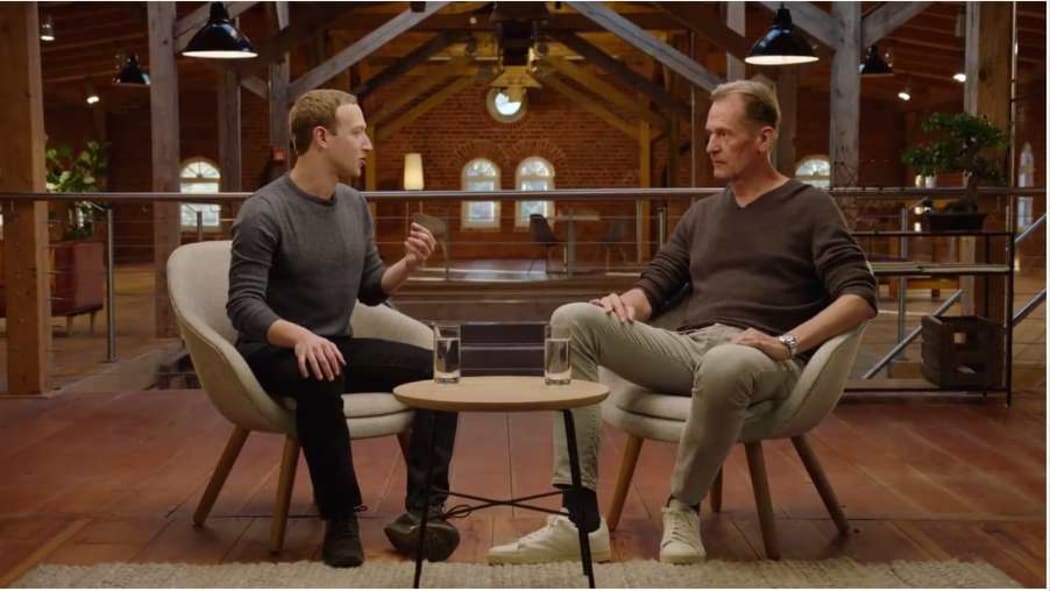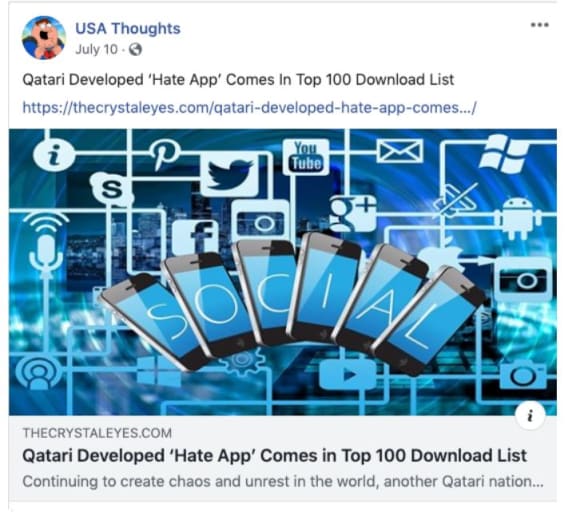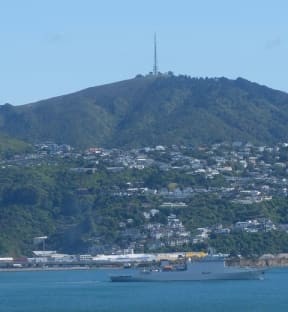Mediawatch's weekly catch-up with Lately. This week Jeremy Rose talks to Karyn Hay about Facebook's latest foray into news; Indonesia's use of Twitter to spread fake news about West Papua; and a Chinese war ship "spotted" in Wellington Harbour.
Facebook has been making the news in the week it announced its latest foray into the news. The New York Times reported this week that Facebook staff had written an internal letter criticising the social media giant's advertising policy.

Mark Zuckerberg and Mathias Döpfner Photo: Facebook: screen shot
Staff argued the policy allows politicians to weaponize the platform by targeting people who believe that content posted by political figures is trustworthy and said it was "a threat to what FB stands for."
Others have been arguing the policy is a threat to democracy itself. Democrat presidential Elizabeth Warren took out a Facebook ad claiming Mark Zuckerberg and his company supported President Trump (neither Zuckerberg nor the company has publicly endorsed a political candidate)
But Zuckerberg has been unapologetic about the policy arguing that freedom of speech and transparency are the best defence against false news. In a speech to Georgetown University earlier this month he said: “People having the power to express themselves at scale is a new kind of force in the world — a Fifth Estate alongside the other power structures of society."
Never mind the Fifth Estate what about the threat to the fourth estate posed by the social media giants?
The launch of Facebook News last Friday is almost certainly a response to those concerns but the jury is out as to whether it will ultimately strengthen the media or simply consolidate Facebook's ever growing dominance over the flow of information.
Facebook News - currently only available to a selected US audience - is a new news tab featuring stories from some of the biggest news outlets in the US including: The Boston Globe, The Washington Post, The Los Angeles Times, The Dallas Morning News, The Chicago Tribune, Gannett, USA Today, McClatchy, Buzz Feed News, Business Insider, Bloomberg, The Atlantic, Forbes, National Review, The Washington Times, Condé Nast, NPR, CBS, ABC, NBC, Breitbart, and News Corp (including Fox News.)
The Washington Post has reported that 200 news outlets have been signed up so far. Facebook is reportedly paying up to $3 million to the contributing news outlets.
A team of professional journalists will be curating the news feed. And you'll be able to personalise the feed: so if you don't think Breitbart is a reliable news source - you don't need to read it.
Emily Bell the director of the Tow Media Centre and a former Guardian journalist summed up Facebook News like this: "Payments to publishers for stories that Facebook might otherwise aggregate for free is a boon for journalism. The idea that there will be a daily, regular newsfeed that’s not filled with nonsense is a boon for Facebook users. The delineation of news as a category distinct from other “content” is a boon for democracy. Yet the readiness with which publishers are seemingly embracing this new business arrangement is discomfiting, given Facebook’s track record, and the total lack of regulation. Will News Corp and others disclose their relationship with Facebook when they cover the tech world? One can only hope so."
Earlier this year Mark Zuckerberg posted a series of video discussions between himself and media thinkers about the place of news on Facebook. In April he spoke to Mathias Döpfner, CEO of Europe’s largest publisher Axel Springer.
And Springer told Zuckerberg this: "The better the business model is that Facebook provides for publishers, the more professional journalists you will attract. As soon as it is only about reach, only about popularity, only about audience the seduction to be a platform for manipulation is so high. Because people want to make a business, we have to make a business in order to finance investigative journalism and correspondents and big foreign networks they cannot afford to do that for free. But manipulators governments from Russia to China. Other sinister sources they can all use it, abuse it and then you have an image problem for Facebook but you also have a structural problem for journalism."
At this stage it's impossible to say whether the business model is more about reach than funding investigative journalism - but the scarcity of details around the funding model suggests this could be business as usual for Facebook.
No news yet on which, if any, New Zealand media outlets will be signed up for Facebook News when it finally rolls out here.
The best defence against consolidating even more power in the hands of Facebook would be for the media in New Zealand to negotiate as a collective arguing for a transparent payment system and a level playing field that saw stories featured on an agreed set of news criteria.
But if the US roll out is anything to go by transparency will be the last thing on Mark Zuckerberg's mind.
The social media battle for West Papua
Bellingcat - an international collective of researchers and investigative journalists - has revealed how hundreds of thousands of dollars were spent on spreading a mixture of false and highly selective and slanted news about West Papua over social media.

A false news post taken down by Facebook Photo: Facebook: screen shot
Journalist Benjamin Strick, who works for the BBC, noticed that a K-pop star Kim Jennie was tweeting a lot about West Papua. But it turned out it wasn't the Korean pop star tweeting but an automated bot.
Further investigation found that the bot was linking to Facebook stories about West Papua that were being placed as ads in Europe, the US and the UK.
And Bellingcat reports that Facebook deleted more than 100 accounts and pages that had spent about $300,000 on ads. "Facebook said the accounts were “involved in domestic-focused coordinated inauthentic behavior in Indonesia” and that the campaigns “created networks of accounts to mislead others about who they were and what they were doing”.
The Facebook announcement also says it took down hundreds of posts that were supportive of the United Arab Emirates, Saudi Arabia, and Egypt; and critical of Qatar, Iran, and Turkey.
As the Bellingcat report points out the manipulation of news in the case of West Papua is particularly worrying because Indonesia so tightly controls the news from the region - rarely granting independent journalists the chance to travel there.
The investigation traced the campaign to a Jakarta-based media company InsightID.
Chinese military ship "spotted" in Wellington harbour

Photo: RNZ/Jeremy Rose
Yesterday Stuff ran a story under the headline: "Chinese naval training vessel, Qi Jiguang, spotted in Wellington Harbour."
It seemed an odd verb to choose for the sighting of a ship. Whales are spotted occasionally - possibly an enemy submarine - the word suggests something out of the ordinary and in the case of military ships - almost threatening.
But the visit of the Qi Jiguang had been flagged on Twitter by Canterbury University academic Anne Marie Brady a week earlier.
A Chinese naval vessel is making a trip to NZ to practice passing through Cook Strait
— Professor Anne-Marie Brady (@Anne_MarieBrady) October 22, 2019
I’d like to hear PLA-Navy explain why they need to know how to do this, & NZ govt explain why they permit it
PLA-Naval Submarine Academy among trainees on the triphttps://t.co/6ulEZsVpDz pic.twitter.com/B18447BF6l
And the China specialist was less than impressed with the Stuff article.
When the watchdogs become lapdogs.
— Professor Anne-Marie Brady (@Anne_MarieBrady) October 29, 2019
Cringe-worthy article on visit of PLAN boat to Aotearoa-NZ @Stuff @DomPost. @ChinaDaily quality reporting. Report fails to mention FONOPs in Cook Strait, trumpeted @Xinhua & delayed arrival timed with patriotic welcome. https://t.co/WY3E2oyjLL
It does seem odd that there hasn't been a more in depth story on the visit.
Voice of America's English language teaching service ran an item that claimed the visit was in part aimed at reducing the influence of Australia in the region.
Newshub described the visit as "under the radar" but said military visits were generally kept quiet by the government.
Pinochet's legacy: torture ship and protests
One naval ship that does attract a news story every time it visits is the Chilean ship the Esmeralda. Received a 21 gun salute on its last visit in July despite its well documented role as a torture chamber during the Pinochet dictatorship.
Stuff reported on it at the time.
The massive protests in Chile have been in the news the last couple of weeks with up a million people taking to the streets of Santiago. But in contrast with the forensic coverage of Brexit there's been very little in the way of in-depth articles about the movements behind the protests.
There are exceptions of course, like this interview with political activist Isidora Cepeda Beccar on the Jacobin site.
The stand-first on the article is:"Chile’s protest movement doesn’t want small concessions. It wants to overturn the entire legacy of neoliberalism and the Pinochet dictatorship." And that captures the essence of what Beccar is arguing but there are plenty of fascinating details in the interview.
It's been widely reported, for instance, that it was a hike in the public transport fares that sparked the protests and that the initial protests were by high school students but not that the high school students' fares hadn't gone up at all. They were protesting on behalf of their families.
Beccar says the protest got a massive boost from President Sebastián Piñera declaration that “we are in a war against a powerful and relentless enemy, that respects nothing and no one." And his decision to call in the army badly backfired on him.
.

